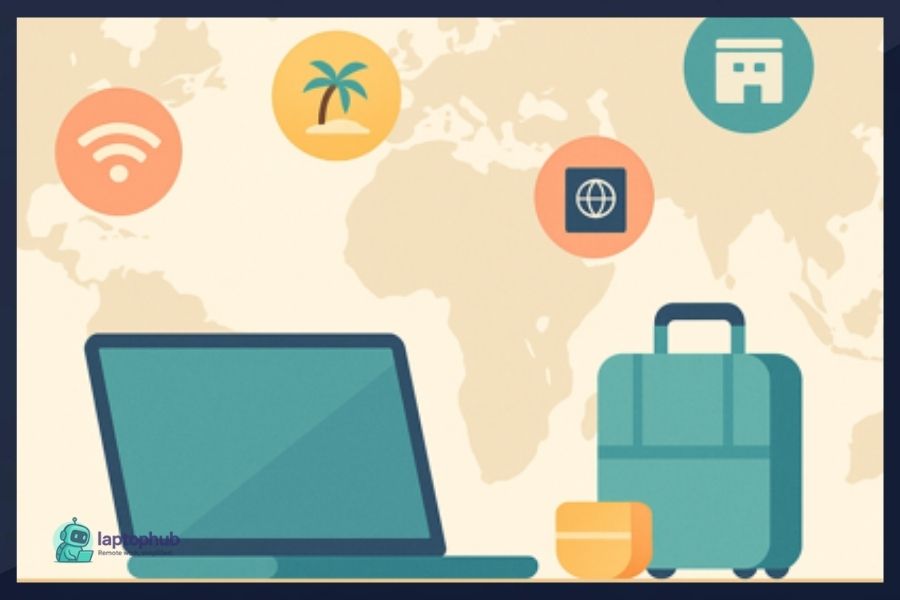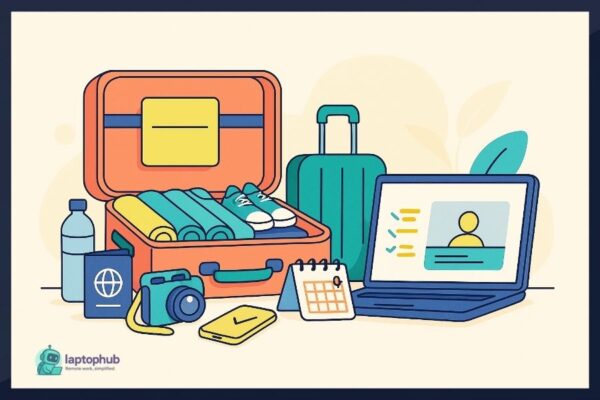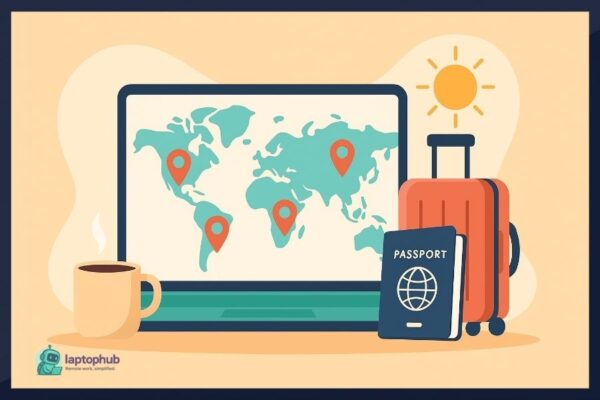The digital nomad lifestyle is no longer just a fantasy for travel-hungry freelancers or tech-savvy millennials. It’s a real, growing movement reshaping how people define work and freedom. Imagine earning a stable income from your laptop while sipping coffee in Prague, practicing yoga in Bali, or hiking trails in Colombia. This lifestyle isn’t about escaping work—it’s about reinventing it on your terms.
💡Key takeaways:
- The digital nomad lifestyle offers location freedom, cost advantages, and the ability to create a personalized routine.
- While appealing, the lifestyle comes with challenges such as visa logistics, social isolation, and travel fatigue.
- With proper planning, tools, and structure, it’s possible to build a sustainable, productive career while being fully mobile.
- The rise of remote work and digital nomad visas signals that this lifestyle is not fringe—it’s part of the evolving future of work.
What Is the Digital Nomad Lifestyle?
A digital nomad is someone who works remotely while traveling or living in different places. Instead of being tied to one city, they choose to work from wherever they feel most inspired. That could mean writing code from a co-working space in Bali, managing clients from a rooftop cafe in Barcelona, or building a marketing agency from a studio apartment in Buenos Aires.
All that’s needed is a laptop, internet access, and a job that doesn’t require physical presence. These professionals span many industries: freelance designers, startup founders, virtual assistants, content marketers, coaches, consultants, and remote employees.
Why People Choose the Nomadic Life
1. Freedom of Location
The biggest appeal is the ability to choose where to live and work. Want to spend winter in Southeast Asia and summer in Europe? You can. No commuting, no cubicle. Just the freedom to design your environment and experience different cultures.
2. Cost Efficiency
Many digital nomads earn income in stronger currencies like USD or EUR while living in countries with a lower cost of living. This allows for a higher standard of living, increased savings, or the ability to invest in personal growth.
3. Personalized Routine
The digital nomad lifestyle empowers people to build routines that support their energy and creativity. You might wake up early to hike, work midday hours, and explore a new city by evening.
4. Escape From the Traditional Work Model
Not everyone thrives in a traditional office environment. Office politics, rigid schedules, and fluorescent lights are not for everyone. Digital nomadism offers an alternative way to stay productive while living life on your own terms.
Challenges of Life on the Road
While this lifestyle offers undeniable perks, it’s far from a nonstop vacation. Here are a few realities that aspiring nomads need to consider:
1. Loneliness and Isolation
Making meaningful connections is difficult when you’re constantly moving. Some digital nomads struggle with loneliness, especially if they don’t actively seek community or travel with a partner.
2. Navigating Visas and Legal Rules
Working remotely across borders often means dealing with complex visa rules. Tourist visas rarely allow for legal work, even remote work. Some countries now offer digital nomad visas, but these require research and paperwork.
3. Maintaining Productivity
Time zone differences, Wi-Fi issues, and unfamiliar workspaces can disrupt your rhythm. Without a fixed schedule, self-discipline becomes crucial.
4. Decision Fatigue and Burnout
Every new location brings new choices: where to live, how to get around, where to shop, which SIM card to buy. Over time, this can wear you down. Travel burnout is real, and managing it takes intentional planning.
Essential Tools for Digital Nomads
To thrive as a digital nomad, reliable tech is non-negotiable. Here are the essentials:
- Reliable Laptop: Lightweight, durable, and high-performance.
- Noise-Cancelling Headphones: For focus in noisy cafes or airports.
- Portable Wi-Fi or SIM Cards: To stay online even in off-the-grid areas.
- Cloud Storage and Backup Tools: Google Drive, Dropbox, or external SSDs.
- Task and Time Management Tools: Trello, Notion, Asana, or Clockify.
Investing in the right gear and apps helps maintain a professional edge no matter where you’re working from.
🖥️ Also read: Best Remote Work Tools 2025: What Smart Teams Are Using Now
Top Destinations for Digital Nomads
Some cities and regions have earned reputations as digital nomad hotspots due to infrastructure, affordability, and community:
- Bali, Indonesia: Known for its co-working culture, wellness retreats, and creative community.
- Chiang Mai, Thailand: Inexpensive, safe, and full of nomads. A top choice for beginners.
- Lisbon, Portugal: Mild weather, vibrant community, and easy access to the rest of Europe.
- Mexico City, Mexico: Great food, fast internet, and growing entrepreneurial spirit.
- Tbilisi, Georgia: One-year visa-free stay for many, low costs, and growing tech scene.
Each location comes with pros and cons. Research climate, safety, visa rules, and community vibe before deciding.
🖥️Also read: Best Countries for Remote Workers in 2025
Professions Suited for the Nomadic Lifestyle
You don’t need to be a tech wizard to go nomadic. Any job that can be done online and doesn’t require physical presence qualifies. Popular fields include:
- Web development and programming
- Digital marketing and SEO
- Graphic design and branding
- Copywriting and content creation
- Online teaching and tutoring
- Project management
- Consulting and coaching
- Dropshipping, e-commerce, and affiliate marketing
More companies are now embracing remote-first models, which means greater flexibility for employees to travel while working.
🖥️Also read: Best Remote Job Niches in 2025 for High-Paying, Future-Proof Careers
Steps to Becoming a Digital Nomad
Ready to take the leap? Here’s a step-by-step plan:
1. Secure Remote Income
Start freelancing, find a remote job, or build a service-based business. Platforms like Upwork, Toptal, Remote OK, and We Work Remotely are solid starting points.
🖥️Also read: Remote Job Boards You Need to Bookmark Right Now
2. Test the Lifestyle First
Before going full-time, take a “workation.” Try working remotely from a different country for a few weeks to see how you handle logistics and productivity.
3. Build a Safety Net
Save at least 3–6 months of expenses. Things can go wrong—delayed payments, health issues, tech failures—so having a cushion is critical.
4. Choose Your First Base Wisely
Pick a beginner-friendly destination with strong infrastructure, solid Wi-Fi, and an existing expat or digital nomad community. This eases the transition.
5. Stay Organized
Use tools like Notion or Google Sheets to track expenses, visas, housing options, and client work. The more systemized your life, the less stress you’ll carry.
Community and Networking on the Road
One of the best ways to stay balanced as a nomad is to find or build community. This helps reduce isolation and keeps you motivated.
- Co-working spaces: These aren’t just places to work. They often host events, workshops, and social meetups.
- Facebook and Slack groups: Many cities have digital nomad or expat communities where people share tips and organize events.
- Meetup and Couchsurfing Events: Great for finding local events and making friends.
- Nomad-specific communities: Platforms like Nomad List or Remote Year offer built-in support networks.
Staying Healthy While Traveling
Health can be neglected when you’re constantly on the move. To avoid that:
- Prioritize sleep, especially when changing time zones
- Carry a basic first-aid kit
- Find local gyms or use fitness apps
- Get international health insurance (e.g., SafetyWing or IMG Global)
- Schedule downtime regularly to prevent burnout
Mental health matters too. Therapy apps like BetterHelp or journaling practices can help maintain emotional balance.
Digital Nomad Visas: A Legal Solution
Several countries now offer visas tailored to remote workers. These provide legal clarity and reduce stress over overstaying tourist visas. Popular options include:
- Portugal: Temporary Stay Visa and D7 Visa
- Estonia: Digital Nomad Visa
- Croatia: One-year stay with proof of remote income
- Costa Rica: Rentista program
- Barbados: 12-month Welcome Stamp
Each visa has its own requirements—typically proof of stable income, health insurance, and no local employment. Always check official government websites for updated criteria.
Is Digital Nomadism Sustainable Long-Term?
Many people wonder if this lifestyle can last. The answer depends on your goals. Some live nomadically for a few years before settling down, while others build long-term, location-independent businesses that allow them to keep traveling indefinitely.
Key to sustainability is setting boundaries. Plan travel around work, not the other way around. Build systems, maintain routines, and take regular breaks from travel to recharge.
Digital nomad lifestyle FAQs
A digital nomad is someone who works online and travels regularly, choosing to live in different cities or countries instead of settling in one place.
They work in remote-capable jobs like programming, design, marketing, writing, teaching, or running online businesses.
It depends on where you go. Many nomads choose low-cost destinations, allowing them to save or enjoy a higher standard of living on the same income.
If your job allows remote work, you can potentially become a digital nomad without changing employers—just confirm the legalities and logistics first.
Yes, in most cases. Some countries now offer digital nomad visas that make it easier to stay legally while working online.
Final thoughts: The future of work is mobile
Choosing the digital nomad lifestyle isn’t just about changing your address; it’s about rethinking your values, routines, and what success actually looks like. It demands courage, self-discipline, and flexibility—but offers rewards that extend far beyond a paycheck. As the line between work and location continues to dissolve, more people will trade permanence for possibility and build careers that fit the life they want—not the other way around.





